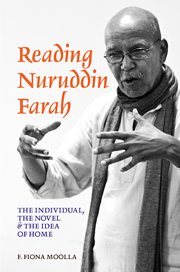Book contents
- Frontmatter
- Contents
- Introduction
- 1 Defining the Individual: Conceptual & Historical Limits
- 2 From a Crooked Rib & the Bildungsroman: Developing the Self, Developing the Nation
- 3 The ‘Gynocentric’ Bildungsroman: Sardines & Gifts
- 4 Modernism in A Naked Needle & Sweet & Sour Milk: Irony, Morality & the Aesthetic
- 5 Close Sesame & the Representation of Heteronomy
- 6 Dissolving the Boundaries of Self & Nation in Maps & Secrets
- 7 Reconstructing the Subject in the Third Trilogy: Links, Knots & Crosbones
- Conclusion
- Bibliography
- Index
Introduction
Published online by Cambridge University Press: 05 April 2014
- Frontmatter
- Contents
- Introduction
- 1 Defining the Individual: Conceptual & Historical Limits
- 2 From a Crooked Rib & the Bildungsroman: Developing the Self, Developing the Nation
- 3 The ‘Gynocentric’ Bildungsroman: Sardines & Gifts
- 4 Modernism in A Naked Needle & Sweet & Sour Milk: Irony, Morality & the Aesthetic
- 5 Close Sesame & the Representation of Heteronomy
- 6 Dissolving the Boundaries of Self & Nation in Maps & Secrets
- 7 Reconstructing the Subject in the Third Trilogy: Links, Knots & Crosbones
- Conclusion
- Bibliography
- Index
Summary
Backgrounds: Orality, Feminism & Exile
Somali writer, Nuruddin Farah Hassan (b. 1945), is known in literary circles as a dramatist, novelist, author of short stories, and also as a non-fiction writer and essayist. It is, however, as a novelist that his work receives most attention. Indeed, Farah's oeuvre seems to compress a history of the novel in his life's work. His novels trace a trajectory from a kind of proto-realism to modernism and postmodernism returning latterly to realism. What makes his oeuvre particularly compelling is the way his work foregrounds the close connection between the formation of the concept of the individual and the development of the novel as a genre. In short, the relationship between the novel and philosophical individualism may be described as being mutually constitutive.
Farah's first published novel, From a Crooked Rib (1970), was written while he was a student of philosophy at the University of Chandigarh in the Punjab. Virtually from the start of his career, he wrote in English, one of five languages in which he is fluent, the others being Somali, Amharic, Arabic and Italian. What makes the first novel especially interesting is the way in which it may be read as representing the entry of Somalia into modernity through writing. Somali culture was almost exclusively oral with poetry at its heart. Despite the inroads of print culture and the recognition of the value of literacy, Somalis remain enthusiastically audio-aural. Somali culture took instinctively to the audio-cassette a few decades ago and currently is exploring the potential of the audio features of the internet for dissemination of poetry and other forms of cultural contact and exchange.
- Type
- Chapter
- Information
- Reading Nuruddin FarahThe Individual, the Novel and the Idea of Home, pp. 1 - 15Publisher: Boydell & BrewerPrint publication year: 2014

